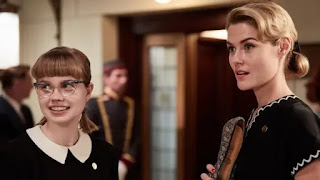Teenaged Lisa starts work on the cocktail frock floor of a big department store in Sydney at the end of the '50s. She quickly proves more capable than the slave status normally accorded a fresh school leaver and is soon head hunted by the even ritzier section of model gowns, presided over by the mysterious mittel European Magda (a superb Julia Ormond) whose quotable savoir faire promise much more and tastier wisdom than the Anglos at the cocktail dress counter. Things look good.
At home Lisa is Leslie, girl from the suburbs whose mum (Susie Porter) makes her clothes for her using the same patterns she used when Leslie was ten. Dad is a burly lug (Shane Jacobsen) who needs a little schooling if he is to survive the decade to come. Leslie eventually must decloset herself about her name change but for the nonce she lives a double life.
Elsewhere at the counter Myra is having trouble getting her husband interested in her and we will hear the gamut of the euphemisms for homosexuality suitable for mixed company until matters get crucial. Her counter mate Fay is bored with the oafs she encounters but doesn't quite know what she wants. Magda's homelife is a pleasantly managed continental European series of fine breakfasts and soirees. The 2018 audience knows the reffo tag for racism and the story will negate the power of it through love of various kinds.
Even the darkest of these themes is blended like the ingredients of mock chicken in an old Home Ec text but lest I give the impression that this is a twee piece I should point out that veteran Bruce Beresford keeps a firm hand on the helm and takes what is essentially a feelgood tale of a girl watching the times around her change and smuggles in a fair amount of contemporary observation to allow some harder corners to poke through.
The xenophobia is not surprising of itself but its casualness might remind an Australian audience of recent speeches on the floor of the Senate that might well have been made during the film's setting. The scenes of mother and daughter negotiation feel natural and pointed clarifying the kind of sexual politics to come. The sexuality of Myra's Frank has a bizarre conclusion, all the more considering that the source novel was not written in the '50s but he '90s. The subplot's wrap-up could have come out of a British grim-oop-north family saga. Source material or hasty writing? It's hard to tell.
Beresford stitches a lot of post war Sydney on film into the palette and we're allowed to see enough of the work to mentally comment. It's a pleasant way of letting us join the real past with the detailed construction of it for most of the screen time.
I kept wincing at the score, though. The mallet approach to emotive orchestral scoring with a piano tinkling in cutely came so close to being embarrassing I wondered if it were irony. But, no, I suspect that the '70s chick flick tweets on the 1001 strings of Bartholemew Cubbins were paid for and delivered without a smirk. I can't fault it for not sounding like John Carpenter but couldn't help feeling that most of the intimate and weighty moments between characters would have meant more if the music was ditched. This kind of jobbing film music neither serves the period of the setting nor this one.
However, I wonder how many people will care about that. Why should they? What they get is a radiant cast performing a frequently amusing and engaging story about a society on the turn that ends, as it must, on a note of naive optimism. Cynicism need not apply here. It's just the adaptation at work. I wasted neither my time nor money on this ticket. I just kept thinking of the similar and more exhilarating earlier Beresford film The Getting of Wisdom. I guess I missed the struggle.

No comments:
Post a Comment